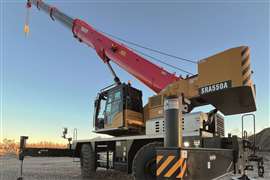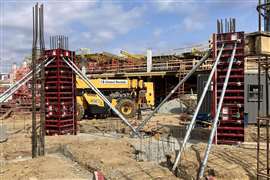Fine tuning: Murray Pollok talks to Riwal's Norty Turner.
14 August 2013

Riwal’s CEO Norty Turner says he wants the company to be at the forefront of developing the access rental market around the world. Murray Pollok spoke to him at the company’s new head office in Dordrecht, the Netherlands.
There’s a restaurant in Riwal’s home town of Dordrecht which has ‘Riwal Salad’ on the menu, testament to the traffic of company staff that have passed through its doors over the years.
It’s still a favourite haunt for company employees, a constant even in the last 18 months that have seen so many changes at the business. Among other things, there is a new CEO, multiple comings and goings among senior managers, and a new location in Dordrecht for its corporate head office, close to the well-known operational base at Maxwellstraat.
The CEO, former Hertz executive Norty Turner, who took over from Dick Schalekamp in March last year, resists the easy interpretation that his arrival has triggered all the changes. For example, the much vaunted Riwal Tuning Programme – a series of 12 management projects aimed at improving efficiencies in all areas of the business – is, says Mr Turner, part of a process that pre-dated his arrival; “With that work on the organisation – and Riwal has always been organised, of course –it was identified that there was much more to be done there, but that process started well before I joined.”
To emphasise that continuity, and deflect the view that his appointment was a kind of break from the past, he reminds IRN of the strengths of his predecessor; “Dick brought so much over the years – really strong leadership, such a natural eye for business development and expansion. He has been so critical to Riwal’s growth.”
Even so, Mr Turner brings something different and it is clear that his brand of management – honed from his 17 years in the US and Europe with Hertz Equipment Rental Co – is in the process of being transplanted into the entrepreneurial, private ownership culture of Riwal.
That culture means that there are definite off-limits in the interview, such as discussion of ownership, and issues such as the precise relationship between Riwal and Manlift, the access and power rental company in the Middle East and India, which Mr Turner describes as a “strategic partner”. The company is also loath to discuss detailed financial or growth targets, although growth, as in the past, is definitely on the agenda.
It is the various changes in the management team, however, that have been eye-catching, with former JLG executive Wayne Lawson brought in to oversee the Northern European territory and Spain, and former HUNE boss Pedro Torres now covering southern Europe and South America. Wolfgang Roth, a senior figure in the German access rental market, now runs Riwal’s German operation.
Former JLG Spain manager Richard Puglia has joined to manage the international rental programme – liaising with customers who operate in more than one country – and ex-Lavendon executive David Cagigas has taken over at Riwal Spain, a move coinciding with the departure of Javier Gomez and Riwal’s acquisition of the full ownership of the Spanish subsidiary.
“In terms of people that have joined us, that’s a lot of talented, ambitious folk”, says Mr Turner, “These are top industry professionals.” It is not unusual, of course, for there to be personnel changes when a new CEO comes in.
With the new management team now in place, the key question for Riwal is where its priorities lie. The international strategy is already established, with operations in Brazil – run by Riwal veteran Jim Roest – and, via Manlift, also the Middle East and India. Among its 16 countries is an operation in Kazakhstan.
For Norty Turner, these international operations assume a very important role in the company. “We’ve proved to ourselves that that we are able to operate in these countries. It takes vision, time, resources and commitment to do that.”
Now that Riwal has the model to open up in these areas, there will be other opportunities; “We think access rental has such a long way to go, it has such a bright future in so many markets, and we want to be at the forefront of taking access to a much higher level.”
The company has a “market attractiveness” tool that looks at economic conditions, risk and market potential in individual countries to create a kind of league table of target markets; “It helps guide out thoughts about where we need to do more in-depth research…if you look at the top 20 markets, they are not all in one continent. It’s a mix among all continents.”
He says market education will play a big part in its efforts in developing markets, and cites approvingly the work being done by IPAF to raise awareness of access and its benefits as well as the importance of training. (A large proportion of Riwal’s workforce, not just operators or service staff, now have their IPAF PAL cards, the management team included.)
The Riwal brand will be used for these international developments and on the question of India, where Manlift has made the running, Mr Turner says only that there has been “internal discussion” but will not add anything.
Despite the importance of its European operations Mr Turner says people might be surprised by the volume of group revenues generated outside of Europe, although is shy of providing the figure.
“We went through the high difficulties of expanding internationally some years ago. It’s fantastic that were in that situation now where we’re able to optimise and move fleet and not be encumbered by the economic situation in one country.
“We can optimise the fluidity of the fleet – move it to where we’re going to get the greatest return. When you go through these quite challenging actions to open internationally – and then prove to yourself that you can operate profitably – then you are able to take advantage when you have a situation like this [in Europe].”
This fleet management aspect has been a key part of the ‘tuning’ programme; “With optimisation of the fleet there have been innumerable number of tangible benefits. Knowing the right fleet to own, to dispose, where the fleet needs to be, where it doesn’t need to be. It’s a science and an art, and we’re very confident about where we are with that.”
When asked about profitability, Mr Turner says the group remains in a “healthy position” and says “If you are focused on your business, on your customers, and managing the efficiency of your processes, you can drive value and profit in just about any market. In some developing markets, labour costs are lower, so that can have an impact on profitability, a positive impact.”
Europe remains the core, and Mr Turner is quick to point out that, despite the economic challenges, Riwal is enjoying “outstanding results” in some markets; “In other markets it’s more challenging, and we’re focused on making efficiencies and improvements.
“In a recession market it comes down to focusing on the customer. If you focus on taking care of your customer…no matter what the macro-environmental climate, there is value to be driven.”
Spain is no doubt where the word ‘challenging’ would apply. Mr Turner will not divulge the long term plan, but says “We’re going to be in Spain, and will continue to improve our operations in Spain. In terms of where we’re going, where we will be in five or 10 years, we don’t share that, but right now we’re committed to Spain.”
There are many areas that remain a “white space” for Riwal in Europe; “and we will continue to look at what makes sense in these white spaces.” Subsequent to the interview Riwal announced the acquisition of the Belgian access division of crane rental company Sarens – a prime example of the filling in the gaps that Mr Turner was talking about.
The company invested around €30 million in 900 new aerial platforms last year – a mix of replacement and expansion – and Mr Turner says this year will see a 30% increase in that investment, which is saying a lot in the current environment. (Riwal would not comment on whether this includes or excludes the Manlift business.)
Overall growth of 21% in revenues will be difficult to repeat this year. “We’re expecting to see group growth in 2013 versus 2012, and certain markets in Europe will also see growth”, he says, “It’s still early in the year – the winter that was our Q1 was an interesting winter that I haven’t seen in Europe since I moved to Europe [in 2007].
“Year-on-year we’re in a good position. It was a challenging Q1, but now in Q2 we are in a good position and we’re feeling really good about the pipeline we’re seeing in the rest of the year.”
There are likely to be further developments in the international business – there are opportunities to grow in Brazil, says Mr Turner – and in Europe there is a continued push on industrial sector work to continue the process of diversification away from construction.
“We’re reaping the benefits of this, and it continues”, he tells IRN, “There are so many opportunities for access as you diversify and educate the marketplace. We feel there has been a lot of delayed maintenance work in various industrial areas, and a lot of maintenance work is coming to the forefront now. They have to do that maintenance or they have a bigger problem longer term.”
The relationship with Manlift – however defined - raises another question, which is the place that power generation rentals has within Riwal. Manlift offers both access and power in the Middle East, so going ahead, would Riwal consider adding power to some of its operations in developing areas (where the power rental opportunity is greatest)? “That’s a strategy issue that I won’t go into a whole lot, but I want to thank you for the question”, he laughs.
There is also the wider question about product diversification. US rental consultant Dan Kaplan said at the ERA convention that access specialist not renting other equipment were penalising themselves.
“I’ve been on both sides [generalist and specialist] in my career”, responds Mr Turner, “When I was on the other side we really struggled to compete against the pure access players. The rental business as a whole is growing – that’s what’s so great about being in rental – and it continues to grow.
“Access rental is growing at an even higher rate than general rental. There’s a reason for that – as you are able to specialise with a certain mix of products, you’re able to take care of the customer who has a need for numerous machines on a given project that you really can’t provide, unless you have a specialist division or specialist company.
“Also, there is a big benefit in having a technical team focused on access; they learn how to best maintain these machines. I’ve been around the dirt [earthmoving machines], the tracks, and seen the replacement jobs on those. I see so many benefits in being a specialist.”
If access is to remain the focus, are there any big departures or innovations in the fleet? Mr Turner says the investment in low level access – with Braviisol and Power Towers being the two main suppliers – has been successful and will continue, with take-up of that product not limited to the UK.
Other areas he highlights include the 14 m electric scissor market, which he says has been good for Riwal, and he also mentions what is claims to be an industry first in European rental in providing solid tyres for its compact telehandlers; “When you’re driving a high-reach forklift on site, a flat tyre is a stoppage. And also from a safety aspect – if you have a load, and you’re on solid tyres, the customer is very confident with that load.”
The company has a number of MEC Titan booms in its fleet, both sizes, and says with these machines it is about market education; “There are some applications where you bring the machine to a customer and their eyes light up.”
He says he was impressed with Terex AWP’s launch of the new 180 ft boom at Bauma, and says that Riwal will evaluate it, as it does all new machines, adding; “I would suspect that JLG will have a counter machine to come out – although I have no inside info on that at all. We’ll evaluate and reach a conclusion.”
The launched of the 180 ft machine, and the unrelated recent fatal accident in the UK involving a Genie Z-135/90 boom owned by Kimberly Access (the cause of which has still to be determined), has prompted discussion about the management of very large machines. Did it spark debate at Riwal?
“It comes down to training”, answers Mr Turner, “If you train your customer in safe operation, that brings confidence. The industry as a whole needs to pull together in tragic accidents like that. For us, safety and safe operation of our machines, both on customer sites and on our own sites – is absolutely critical.
“That is one accident, but it’s not the first. The IPAF initiative [to report accidents] is very important. Reporting accidents and near misses is absolutely critical.”
The engagement with IPAF and operator training is not new, but it seems that the new regime has given it an extra push, another symptom of the changes underway at the company.
Some have even speculated that the new management team and subsequent initiatives are part of a broader plan to prepare the way for a possible sale of the business, perhaps in a few years time.
Mr Turner says he can’t comment on behalf of the owners, but does offer a view of his own; “I think it has been important to realise that the things we’ve done with Riwal have been important to do no matter what phase the organisation might be in.
“As a management team that’s what we’re focused on: improving our operations, positioning ourselves to better serve our customers, to have a company that is a thriving place to work for our employees. That’s what we’re focused on.”
So amidst all the change there are some things that stay the same. And what’s more, ‘Riwal salad’ is still on the menu.






